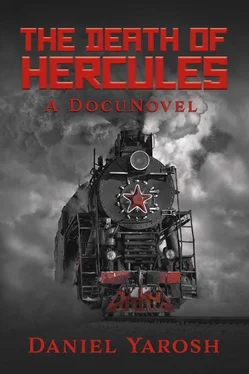Zubadin marched directly to the lead car without a word; the security detail walked backward with rifles drawn. Zalmund drove with a shaky hand and a steadfast gaze on the road ahead. His stomach heaved, but he could do no less than his comrades in will and determination.
The procession returned to each of the kulak’s homes in turn. As they approached Dubetsky’s farmhouse, the smoke rising to the sky was visible from half a kilometer away. They did not reach the front door. The security detail met the cars near the wagons on the road leading to the house. Zalmund could see flames rising from the roof and smoldering timbers through the smoke, but no other living souls. As he drove away, he heard a shriek of grief from behind; or was that the blood pounding in his ears?
Zubadin was silent the entire ride back to Moscow. The two Poles smoked cigarettes and joked about the pleas from the daughters of the kulaks as they put the torch to their house.
When Zalmund returned to Moscow, he told Deena of the events in Balashov in a cool, quiet voice. He reported the facts, the look on the faces of the kulaks and their wives, the coldness of Zubadin as he executed the priest.
“My God, Zalmund, that could have been my family!” Deena shrieked.
He paused and looked down. Through his eyebrows he looked up at her. “Do they deserve it?”
“Nobody deserves to die like that”, she hissed at him.
“Nobody deserves to die” he said.
“This has gone too far, Zalmund” Deena said, taking his hands.
“This is not something that can be stopped, my love,” he said, stroking the hair on the side of his face. “We are not doing this but watching it. I saw the force in Zubadin’s eyes. It is their time, the Bolsheviks. Right or wrong has nothing to do with it.”
Was this true? He was looking over a cliff, enthralled by a morbid admiration for the raging river below, when suddenly he fell in, or did he jump? He struggled to get to shore, but the current was strong, and the water was cold and silent. He fought against the white water, he went under and came up gasping, his lungs heaved. And then he stopped. He laid his head back with his arms outstretched and the river carried him down. How can a river be wrong?
**********
On one of their outreach missions at twilight of a humid June day, Alexandra asked Deena to take the tram to the Boulevard Ring. The center of Moscow is semi-encircled by a ring of grassy boulevards lined with benches. On many street corners were narrow bodegas selling newspapers, Zodiak cigarettes, and sometimes vodka and tea. As they walked along, Deena could feel Alexandra’s hot breath in her ear as she told her the rumors of the people in the Party.
The pedestrian traffic increased near the Moscow theaters that were just off the Ring. Here some sat on the benches, smoking and talking. At the public toilets in this district, homosexuals gathered to make their connections. Nearby at Trubnaia Square Deena saw women dressed in gaudy, low cut dresses lounging on the low stone walls. Some wore their corsets exposed with high-heeled black mid-calf boots. She was taken aback at the sight, but Alexandra squeezed her hand harder.
“These are the last people our Revolution can help,” Alexandra whispered to Deena. “They are trapped by their bodies, the men too. In this exploitation.” The words were too fast, Alexandra’s breath too short. She moved deliberately toward a corner.
“No,” Deena gasped reflexively. She let go of Alexandra’s hand. Alexandra kept walking and turned back to look at Deena, with half-closed eyes, and a sly smile. As Alexandra approached one young girl in the group, she looked up and locked her stare. She had dark brown hair drawn back in a bun, with a few coyly placed wisps of hair pulled down along her right temple and left ear. Her smirk was twisted onto her bright red lips but was belied by her dark eyes that glanced quickly about the square with what Deena saw as fear. A black corset over her patterned red dress was drawn tight at the waist but left invitingly open at the top. From a distance Deena saw that Alexandra spoke to the girl, and the girl responded with short answers at first, then with longer sentences. She looked over Alexandra’s shoulder, pretending to search for clients, but Alexandra was determined, and soon she had her attention. Another joined and then another. Their voices were never raised, but the conversation was animated. Then they stopped, and Alexandra turned to walk back to Deena. She had a certain saunter now, a swing to her hips.
“Can we go?” Deena asked.
“Not now.”
They stood and walked along the Square, as men passed through without notice, or slowed, and carefully eyed the girls. Some would talk but then move on. Soon, one spoke to a girl, then offered his arm. She took it and they walked to Tsvetnoi Boulevard. Alexandra and Deena followed at a discreet distance. At the corner the couple turned down the street of wood-framed apartment buildings. At a narrow entrance of one, the door opened as the girl approached, and an older woman blocked the door. She spoke to the man, who reached in his pocket for something for the older woman. She stood aside and the couple stepped in.
From a distance, Deena felt a twist in her stomach. Her pulse raced. What would happen? Alexandra leaned to her ear, her hot breath close by.
“She will tease him, and wash him, to make him finish quick.” Deena closed her eyes, her ears pounded. She opened them and looked at Alexandra but couldn’t and looked away.
“If he looks rich and she doesn’t know him, she will take him to a certain house,” Alexandra hissed in her ear as she squeezed her hand. “The madam waits until he is undressed, and excited and ready.” Deena bit her lip. “The she sends in her hammer, who beats him, and takes the money from his clothes.” Deena gasped. “The girl only gets a quarter of it.”
On the tram ride home Alexandra talked admiringly about the power of the women. They earned their living from the bourgeoisie oppressors and gave nothing in return. Deena barely listened. Alexandra was famous for her comment that in the Revolution making love was no more than taking a glass of tea. That scandalized Lenin, who retained middle class sexual mores, but the remark no doubt was frequently repeated to the mistresses of the Commissars. Alexandra continued, the women met a social need occasioned by the weakness of men, brought on by the exploitative nature of the Imperialist culture. When the Revolution succeeded, the need would be gone, and this profession would also disappear.
Deena could not get out of her mind the apprehension in the look of the girl as she took his arm. She remembered the false strut to the narrow house, the slack stance at the doorway as her virtue was negotiated. They clasped hands in Deena’s lap, Alexandra for the intensity of the polemic, Deena for another reason.
At home Deena said nothing to Zalmund of the tram trip. But he noticed small changes: more teasing before bed, some small deliberate cruelties in foreplay. One time she hid his clothes after he had fallen asleep. He was surprised and exhilarated. He did not always like it. But it was new and against all that came before. It was nothing that he could have imagined before.
**********
The focus of the Office of Women’s Welfare in the summer was the Women’s Congress planned for November. Here Kollontai hoped to impress the ruling circle with the power of women in the Revolution, and their demands for independent, productive, paid employment. She had made plenty of enemies among the apparatchik, who spread rumors that her real intentions were to collectivize families and conscript twelve-year-old girls to become mothers. Someone had even burned down the small apartment building she had found to set up the first center for care of new mothers.
Читать дальше












